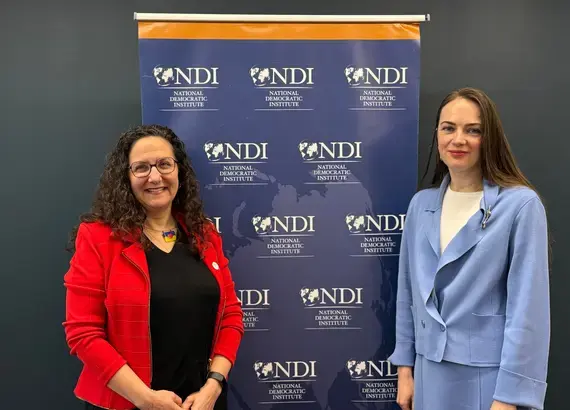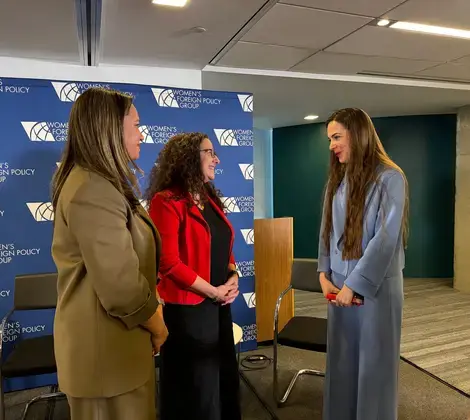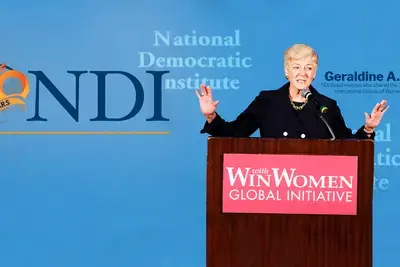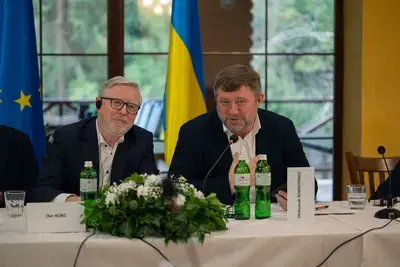
Success Story
Ukraine: Democracy's Front Line
In April, NDI and the Women’s Foreign Policy Group co-hosted an event that focused on the role of women in Ukrainian democracy, featuring Dr. Tamara Cofman Wittes, the President of NDI, Oleksandra Matviichuk, a Ukrainian human rights lawyer and Nobel Laureate, and moderator Sarakshi Rai from The Hill. Together, these expert women presented a unique perspective on the current state of Ukrainian democracy, reflecting on how the war has impacted women and what may be ahead for Ukraine’s and the world’s battle for democracy. C-SPAN covered the event.
The panelists provided an overview of the current state of Ukrainian democracy and the next steps on its path to reform in the midst of the Russian invasion. Ms. Rai asked about potential future elections in Ukraine and the state of its current democratic path. Ms. Matviichuk shared how technically difficult it would be for Ukraine to hold an election right now, given the number of displaced people, Ukrainian troops on the front lines and the amount of resources a large-scale election would take. She went on to highlight how, in the context of the ongoing war, it would be difficult for government officials and civil society to promote the type of pre and post-election environments necessary for the voting process to be free and fair.
Dr. Wittes built upon this point, noting that NDI polling shows that 85% of Ukrainians don’t want to have an election while the war is ongoing. They recognize that during wartime, it would be virtually impossible to run a fully competitive and participatory election due to the myriad of associated technical and security difficulties. An election run under these circumstances might undermine the legitimacy of the outcome and the people's trust in the democratic process. Ms. Matviichuk emphasized the strength of the Ukrainian people’s desire to seek a Euro-Atlantic future. As such, despite Russia's brutal attempt to disrupt this, Ukraine’s path to European Union (EU) accession serves as an important guide for the country.
After establishing a wide-lens perspective on the state of Ukrainian democracy, the guests then shifted to addressing one of the most horrific and damaging aspects of the war: the use of sexual violence against Ukrainian women and girls as a weapon of war by the Russian military. Ms. Matviichuk outlined how this tactic seeks to demoralize all Ukrainians by dehumanizing Ukrainian women. She discussed her organization’s work documenting the devastation the survivors of this conflict-related sexual violence have experienced during the war and the steps being taken to empower them, support their search for justice, hold their Russian perpetrators to account and provide resources to begin the healing process from such devastating trauma. Ms. Matviichuk described how the survivors have differentiated demands, saying, “I work directly with victims of this war… and I know that different people see justice very differently. For some people, justice means to see their perpetrators behind bars. For some people, justice means to get compensation…For some people, justice means just to know the truth of what happened to their loved ones…For other people, justice means a chance to be heard and a recognition that something that happened to their families is not just wrong, it’s illegal.”
Dr. Wittes expanded on the importance of this work, discussing NDI’s long history of working on gender-based violence. “Our work around the world has shown that even as we give women the skills and the confidence to engage in politics, even as we remove the barriers to women’s political participation, they then face disproportionate attacks on social media, physical attacks. And that then deters them in from remaining in the political process.” This lived experience, Dr. Wittes added, affects women survivors of gender based violence – like those Ms. Matviichuk works with – even more acutely.

Ms. Rai, Ms. Matviichuk and Dr. Wittes chatting after the panel.
Moderator Ms. Rai, moved the conversation along another path asking Dr. Wittes and Ms. Matviichuk to address what Russia’s invasion of Ukraine means for the future of democracy.globally. Dr. Wittes explained that Ukraine is fighting a war not just to protect its homeland, but also to stand up for the values of self-determination and democracy worldwide. Agreeing with this point, Ms. Matviichuk added that the contrast that a free and democratic Ukraine would cast on the Russian system is simply unacceptable for autocrats like Putin. She went on to say autocrats globally perceive this contrast as so threatening that a number of countries like China, Iran and North Korea are embracing Putin and supporting Russian war efforts. Dr. Wittes called for democracies to similarly gather around their shared identity and push back against this developing coalition of autocracies. And yet, even with the power of this looming autocratic threat, Dr. Wittes and Ms. Matviichuk left the audience with a sense of hope for a democratic future. Dr. Wittes pointed to examples of democratic resilience around the world, including in Senegal, which just held a free and fair election followed by a peaceful transfer of power that looked impossible even months ago. Elections in Guatemala, Turkey, and Poland are further evidence that the democratic spirit remains strong.
This event highlighted the ways the Ukrainian people and an active civil society with the engagement of many women in leadership roles across the country's sectors, have persisted in protecting their values and strengthening democracy during a brutal and unjust invasion. Ukrainians have bravely redoubled their efforts to reform the country's judicial and electoral systems, fight corruption in critical infrastructure sectors, adopt global norms for equality (such as the Istanbul Convention), and opt into institutions that uphold democracy worldwide. NDI applauds the work of partner organizations like Matviichuk’s Ukrainian Center for Civil Liberties, which are working to establish the basis for an equitable and resilient post-conflict democracy in Ukraine.



